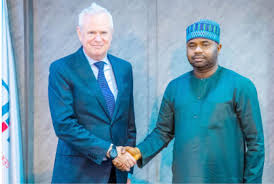The Federal Inland Revenue Service (FIRS) has officially started discussions with the Kingdom of the Netherlands to renegotiate the existing Double Taxation Agreement (DTA) between the two countries. The fresh talks come after President Bola Ahmed Tinubu signed several new tax reform bills into law in June 2025, marking a major shift in Nigeria’s tax administration and fiscal direction.
The meeting to launch the renegotiation was held at the FIRS headquarters in Abuja on Monday, July 7, 2025. The Executive Chairman of FIRS, Dr. Zacch Adedeji, hosted a high-level Dutch delegation led by the Netherlands’ Ambassador to Nigeria, Bengt van Loosdrecht. The session marked the beginning of what both parties described as a new chapter in Nigeria’s international tax cooperation.
Dr. Adedeji, while welcoming the Dutch delegation, said the renegotiation was necessary in view of recent changes in both local and global tax landscapes. He explained that Nigeria’s new tax regime, along with international efforts to combat Base Erosion and Profit Shifting (BEPS), had made the current tax agreement outdated.
According to him, “Recent developments in the domestic and global tax landscape have made the review of the existing agreement unavoidable. Particularly, the tax reforms being carried out by our government, global measures against Base Erosion and Profit Shifting and other evolving international tax standards will render the extant agreement out-of-date.”
The four new tax acts signed into law by President Tinubu include the Nigeria Tax Act, the Nigeria Tax Administration Act, the Nigeria Revenue Service (Establishment) Act, and the Joint Tax Board (Establishment) Act. These laws aim to restructure how tax collection, administration, and enforcement are handled in Nigeria. One of the goals is to remove outdated treaty clauses that have hindered revenue collection and created loopholes for multinational tax avoidance.
Dr. Adedeji emphasized that the talks with the Netherlands align with President Tinubu’s fiscal policy objectives, which include widening the country’s tax net, increasing government revenue, and building an inclusive and fair tax environment that supports economic growth.
He noted, “This renegotiation meets with the policy objectives of the ongoing fiscal and tax reforms initiated by the administration of President Bola Tinubu. We are committed to broadening the domestic tax base, strengthening tax administration, and ensuring that our tax system supports inclusive economic growth.”
On his part, Ambassador Bengt van Loosdrecht thanked the FIRS for the warm reception and reiterated the Dutch government’s commitment to sincere and constructive negotiations. He stated that the willingness of both countries to meet for talks reflected a strong spirit of partnership.
“The fact that we meet here today is an indication of the goodwill and the good faith in which we want to meet with each other. And I can assure you that my colleagues from the Netherlands will act in good faith. That is always an important basis for good negotiations,” he said.
Speaking further, Ambassador van Loosdrecht said, “Ultimately, a treaty is about finding common ground and building upon that common ground. I know both of our sides have very competent, professional teams, and I am confident we will have a very fruitful week.”
The FIRS has also outlined a six-month transition period, leading up to January 1, 2026, when the newly established Nigeria Revenue Service is expected to fully take off. During this period, tax data will be harmonised, legal provisions from the new acts will be implemented, and outdated treaties such as the one with the Netherlands will be updated to match Nigeria’s new tax reality.
A statement from FIRS reads: “This transition period will also cover the review of existing tax agreements to ensure they reflect the provisions of the new reforms.”
The DTA renegotiation with the Netherlands is the first of its kind since the new reforms were introduced. It is also a signal to other trade partners that Nigeria is serious about updating its tax agreements to eliminate double taxation challenges and encourage fairer taxation for both local and foreign investors.
